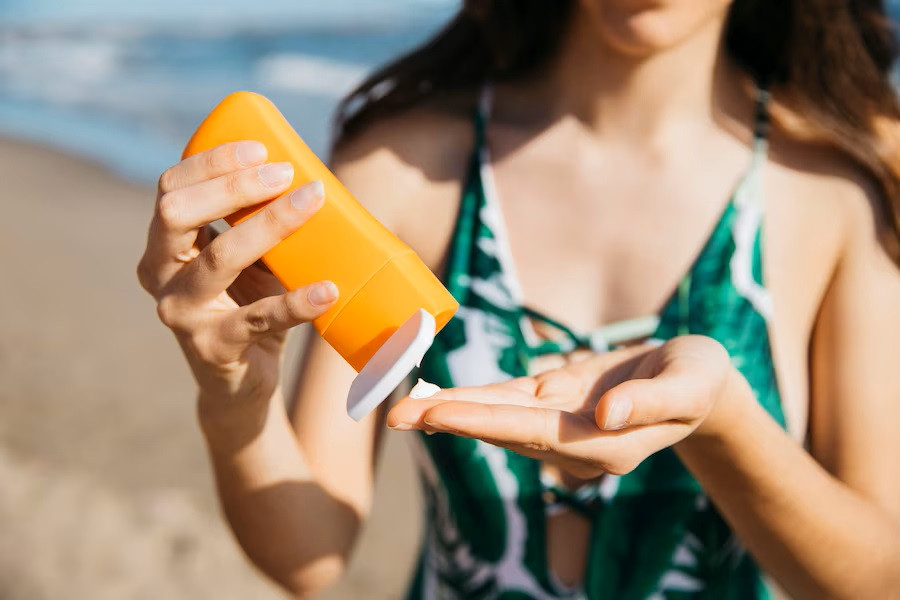Sunscreen is now considered essential for skincare. Using sunscreen can help shield the skin from UV radiation, which can harm the skin and have long-term negative effects on health.
At the moment, the two types of sunscreen that are most commonly used are chemical and physical. Which of the two is better? Check out the review below.
What is physical sunscreen?
Physical sunscreen, also known as mineral sunscreen, is a kind of sunscreen in which the main active ingredient is a mineral, such as titanium dioxide or zinc oxide.
Physical sunscreens function by deflecting UV radiation from the skin's surface. The mineral particles that are applied to the skin create a thin layer that covers the skin, functioning as a physical barrier and reflecting UV rays to prevent skin penetration. Because the chemical components of physical sunscreens do not absorb into the skin, they are an excellent option for people with sensitive skin or who are prone to irritation.
Pros and cons of physical sunscreen
Pros:
- Able to protect from both the UV A and UV B spectrum
- Safe for sensitive skin
- Provides protection immediately after application without the need for a long waiting period
Cons:
- Leaves a white residue on the skin, especially on dark skin
- The formula is frequently thick and heavy on the skin, which makes it less ideal for use under makeup on a daily basis
- It needs to be applied more often to provide optimal protection
What is chemical sunscreen?
Chemical sunscreen is a type of sunscreen that uses active chemicals as its main protective agent. Common chemicals used in chemical sunscreens include Oxybenzone, Homosalate, Octinosate, Octocrylene, and Avobenzone.
Chemical sunscreens function by absorbing UV rays that penetrate the skin and transforming them into heat energy that is then released from the skin. Unlike physical sunscreens that work on the top layer of the skin, chemical sunscreens work within the skin before reaching the deeper layers of the skin.
Pros and cons of chemical sunscreen
Pros:
- Light texture that is suitable for daily use under makeup
- Leaves no white residue and is suitable for all skin tones
- Longer-lasting when used outdoors due to its water-resistant formula
Cons:
- Certain chemicals found in chemical sunscreens have the potential to irritate sensitive skin or trigger allergic reactions
- It takes approximately half an hour to completely absorb and start offering UV protection
Which type of sunscreen is better?
After looking at the comparison of the two sunscreens, which is better, physical or chemical sunscreen?
Experts say that each type of sunscreen has benefits and disadvantages. Depending on your needs and skin type, the type of sunscreen you use is a personal preference and an important choice. It is much better to use a physical sunscreen if you have sensitive skin. On the other hand, a chemical sunscreen is preferable if you have normal skin and need a mild formula.
Always read labels carefully, and if you have any specific questions about the sunscreen product you are using, get advice from a dermatologist. If you need medical advice or consultation, you can either visit a doctor or make use of the consultation features that are available in the Ai Care application by downloading the Ai Care application from the App Store or Play Store.
Looking for more tips and tricks for health, first aid, and other home treatments? Click here!
- Sean Edbert Lim, MBBS
American Academy of Dermatology Association. How to Select a Sunscreen. Available from: https://www.aad.org/public/everyday-care/sun-protection/shade-clothing-sunscreen/how-to-select-sunscreen
Jessica Timmons (2022). What’s the Difference Between Physical and Chemical Sunscreen?. Available from: https://www.healthline.com/health/physical-vs-chemical-sunscreen
Cleveland Clinic (2023). Yes, You Should Wear Sunscreen Every Day. Available from: https://health.clevelandclinic.org/why-you-should-wear-sunscreen-every-day
John Hopkins Medicine. Sunscreen and Your Morning Routine. Available from: https://www.hopkinsmedicine.org/health/wellness-and-prevention/sunscreen-and-your-morning-routine
Zoe McDonald (2023). The Difference Between Mineral and Chemical Sunscreen. Available from: https://www.health.com/mineral-vs-chemical-sunscreen-7495073











